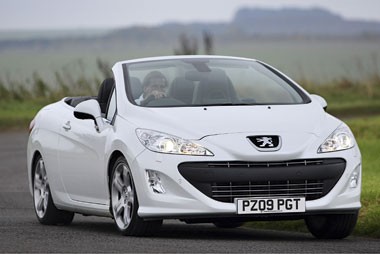Review
Not too long ago, convertible cars were a no-no on choice lists because of safety and security concerns.
But the raft of new ‘coupe-cabriolet’ models with their folding metal hardtops have answered both of these concerns, giving car firms another route to the user-chooser market.
Peugeot has been there from the start with CC versions of the 206 and 307, and now it’s the turn of the 308 model, a car which Peugeot has high hopes for in the corporate market.
It expects 35% of the 5,000 full-year sales to go to user-choosers, with the remainder taken up by private buyers.
And, Peugeot promises, no cars will go into daily rental.
That message has certainly got through, with CAP estimating the 308 CC on test will be worth £7,575 (35% of cost new) after three years and 60,000 miles.
That’s nearly as much as the Volkswagen Eos (£7,950/36%) and well ahead of the Ford Focus and Vauxhall Astra featured here, which both return just 25%.
With the knock-on effect of more affordable monthly rental rates, the 308 CC is in a prime position.
And while CC models may seem like an unimportant niche in the volume worl of fleet sales, they have a particular role to play in helping companies recruit and retain the best staff by being able to offer something different to a standard hatch or saloon.
On the balance sheet the 308 puts up a strong showing.
The 2.0 HDi diesel on test has CO2 emissions of 155g/km, putting it in the more favourable half of the writing-down allowances camp, while for drivers benefit-in-kind tax amounts to £146 a month for a higher rate taxpayer.
To put that figure into perspective, a standard 308 five-door hatchback with the same engine and trim level will cost £129 a month.
For an extra £17 a month, a CC driver gets a far more desirable car (and one that will be worth far more after three- years/60,000-miles) with a fully-electric metal roof that descends into the boot in 20 seconds and leaves you with a four-seat (although the rear two are tight on legroom) convertible.
When it clouds over, put the roof back up and you’re left with a snug coupé with well suppressed wind and engine noise intrusion into the cabin.
A convertible has never seemed so sensible for fleet purposes.
Fleet view
We operate a user-chooser scheme for senior managers who want high-quality, stylish cars. We feel the 308 CC is likely to be a hit with our drivers.
Jon Foley, UK purchasing manager, Ecolab
Rivals
- Ford Focus 2.0 TDCi CC-2
- Vauxhall Astra TwinTop 1.9 CDTi Air
- Volkswagen Eos 2.0 TDI SE
P11d price
308 and Eos look good value, while Ford price rises have pushed Focus to nearly £22,600.
1. 308 £21,895
2. Eos £21,936
3. Astra £22,055
4. Focus £22,590
Emissions and tax
Eos will cost a 40% taxpayer £146 a month. The 308 costs £160, Astra £161 and Ford £165.
1. Eos 148g/km/20%
2. 308 155g/km/22%
3. Focus 156g/km/22%
4. Astra 159g/km/22%
Fuel costs
VW claims 50.4mpg combined. Peugeot and Ford deliver 47.9mpg, and Vauxhall 47.1mpg.
1. Eos 9.24/£5,544
2. 308 9.73/£5,838
3. Focus 9.73/£5,838
4. Astra 10.06/£6,036
Wholelife costs
Eos enjoys a 1.6ppm advantage over the 308. Astra and Focus are too expensive here.
1. Eos 36.01/£21,606
2. 308 37.60/£22,560
3. Astra 40.23/£24,138
4. Focus 41.70/£25,020
Leasing rates
Lowest monthly rental with maintenance from comparecontracthire.com (excluding VAT).
1. Astra £343 (Masterlease)
2. Eos £396 (Masterlease)
3. Focus £420 (Days CH)
4. 308 £441 (TCH Leasing)
Verdict
The Volkswagen is the clear winner here, offering fleet managers the lowest wholelife costs and drivers the lowest benefit-in-kind tax bills and highest fuel economy returns. The Peugeot is second, but its highest monthly lease rate indicates a lower level of support
for the 308 CC.
Winner: Volkswagen Eos 2.0 TDI SE

















Stevie T - 05/03/2017 07:02
It’s good read that the engine and wind noise are suppressed with roof down. How are these bogeys playing out when the roof’s down? My ride was so annoying that I had to mount an additional wind deflector. Now the wind noise and turbulence are suppressed to a great extent. Nothing palpable thanks to the Backblade wind restrictor.